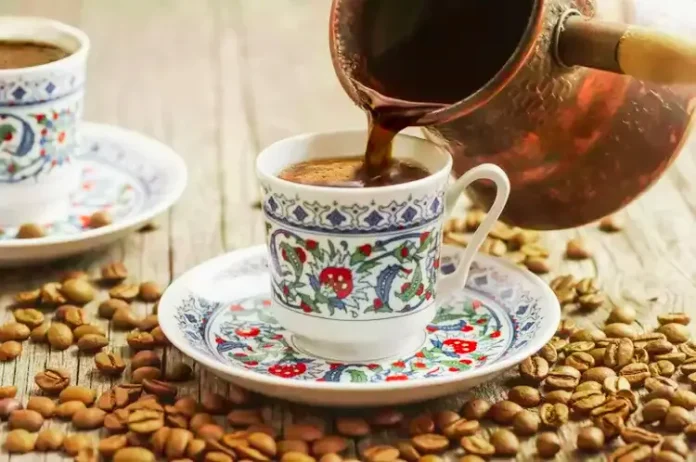Mardin, one of the cultural jewels of Southeastern Turkey, is home to a beverage that is far more than just a drink. Known for its intense aroma, dark consistency, and ritualistic serving style, Mirra coffee has been preserved as a cultural treasure for centuries. Carefully brewed in copper pots, boiled repeatedly, and shared in small cups, this unique coffee continues to play an essential role in the daily life and social traditions of the people of Mardin.
While modern café chains and espresso machines dominate big cities, in Mardin the heritage of Mirra remains alive, carrying with it stories of hospitality, respect, and togetherness. Let’s take a closer look at this extraordinary drink and discover why Mardin locals continue to consume it glass after glass.
The Origins of Mirra Coffee
The word “Mirra” comes from the Arabic term “mur,” meaning bitter. Unlike regular Turkish coffee, Mirra’s preparation process and symbolism make it stand out as a cultural ritual rather than just a beverage. Its roots stretch back hundreds of years, traveling from the Arabian Peninsula to Mesopotamia, and eventually becoming an integral part of communities in Şanlıurfa, Hatay, and Mardin.
Historically, Mirra was considered a symbol of hospitality and honor. In many parts of the Middle East, refusing a cup of Mirra could even be seen as disrespectful, while accepting it was a gesture of friendship and trust. Over time, the drink became a living cultural bridge between different communities.
A Unique Brewing Process
One of the most fascinating aspects of Mirra is its preparation method, which requires patience, precision, and skill. Unlike traditional Turkish coffee, where finely ground beans are quickly boiled once, Mirra is brewed through a lengthy ritual:
- The coffee beans are roasted darker than usual, giving them their signature strong and smoky flavor.
- Instead of being finely ground, the beans are coarsely crushed, creating a thicker texture.
- The coffee is then boiled repeatedly in copper pots (called cezve), sometimes for hours.
- Each stage of boiling enhances the bitterness and concentration, resulting in a drink with intense aroma and a sharp, lingering taste.
The outcome is a dense, bold, and unforgettable beverage, often described by locals as “a taste you cannot forget after the first sip.”
Rituals of Serving: More Than Just Coffee
Perhaps the most fascinating element of Mirra is not the drink itself but the traditions tied to its serving. Unlike regular Turkish coffee served in small cups with handles, Mirra is poured into tiny handleless cups.
Here’s where the cultural rules step in:
- After drinking, the guest must return the cup immediately.
- Holding onto the cup for too long traditionally implies a playful rule — the guest is expected to fill the cup with gold as compensation.
- In weddings and community gatherings, the person serving Mirra often does so with ceremonial gestures, reinforcing the respect and connection between host and guest.
This ritual transforms Mirra from being just a beverage into a social contract of respect, generosity, and hospitality.
Mirra in Modern Life
Today, despite the global rise of coffee culture — from cappuccinos to cold brews — Mirra maintains a special place in southeastern Turkey.
- In Mardin’s rural villages, families still prepare it daily in copper pots.
- In urban areas, Mirra is often reserved for weddings, funerals, and special ceremonies.
- Some local restaurants and cultural cafés offer Mirra to visitors, giving tourists a taste of authentic tradition.
What makes Mirra resilient is its symbolic role — it isn’t just consumed for caffeine but as a ritual of identity, history, and unity.
Why Tourists Should Try Mirra in Mardin
For visitors, tasting Mirra is an immersive cultural experience. Unlike drinking coffee in a café, having Mirra in Mardin means being invited into a ritual of hospitality. Tourists often describe the flavor as “shockingly bitter at first,” but many find themselves coming back for another cup.
Beyond the taste, Mirra tells a story of migration, adaptation, and survival. It is a drink that connects generations, reminding locals of their ancestors while welcoming outsiders into their traditions.
Mirra Compared to Turkish Coffee
Although Mirra and Turkish coffee share some similarities, they are fundamentally different:
- Roasting: Mirra beans are roasted longer, giving them a much darker flavor.
- Grinding: Turkish coffee is finely ground, Mirra is coarsely crushed.
- Brewing: Turkish coffee is brewed once, Mirra is boiled repeatedly.
- Taste: Turkish coffee is smooth and balanced, while Mirra is sharp, bitter, and highly concentrated.
- Ritual: Turkish coffee is associated with fortune-telling (fal), while Mirra emphasizes respect, obligation, and hospitality.
These differences highlight how each coffee reflects unique cultural identities within Turkey.
Keeping the Tradition Alive
In recent years, local cultural organizations and tourism boards in Mardin have started promoting Mirra as part of intangible cultural heritage. Events, coffee festivals, and documentaries are helping to spread awareness of its rich history and unique preparation methods.
Some locals also see Mirra as an opportunity for culinary tourism, inviting visitors to not only drink the coffee but also learn to brew it in workshops.
Conclusion: More Than Just a Bitter Drink
Mirra is not simply coffee. It is a ritual, a heritage, and a story. In Mardin, every small cup represents centuries of tradition, bonds of community, and expressions of respect.
For the people of Mardin, Mirra is part of daily life. For travelers, it is an unforgettable taste of history. Its bitterness may surprise you, but its cultural richness will stay with you long after the last sip.
see also

